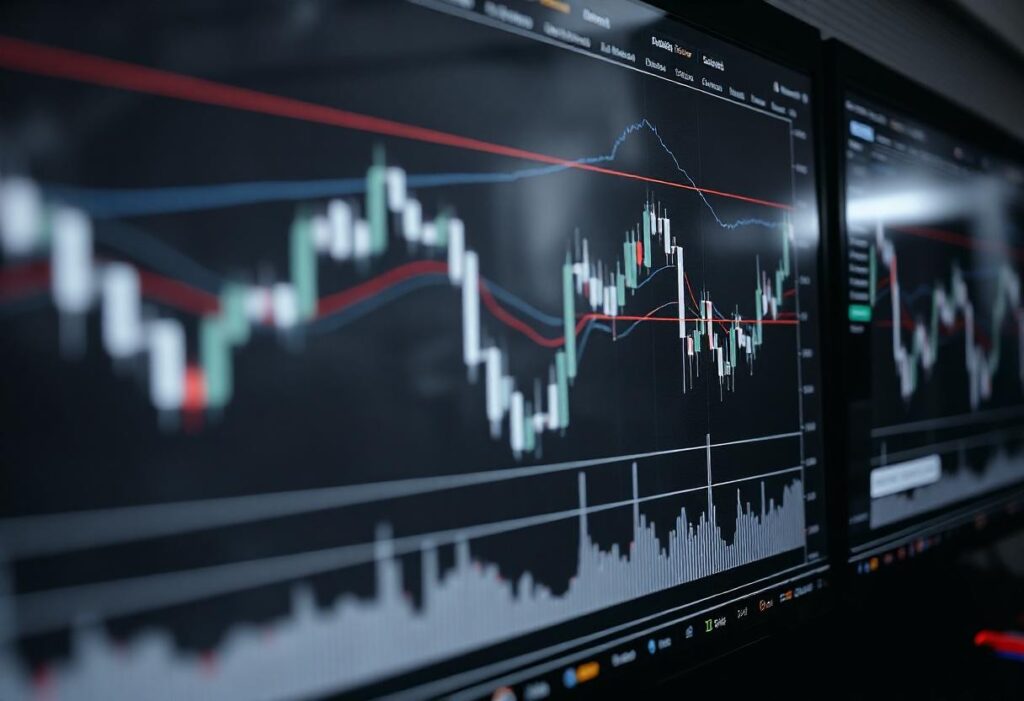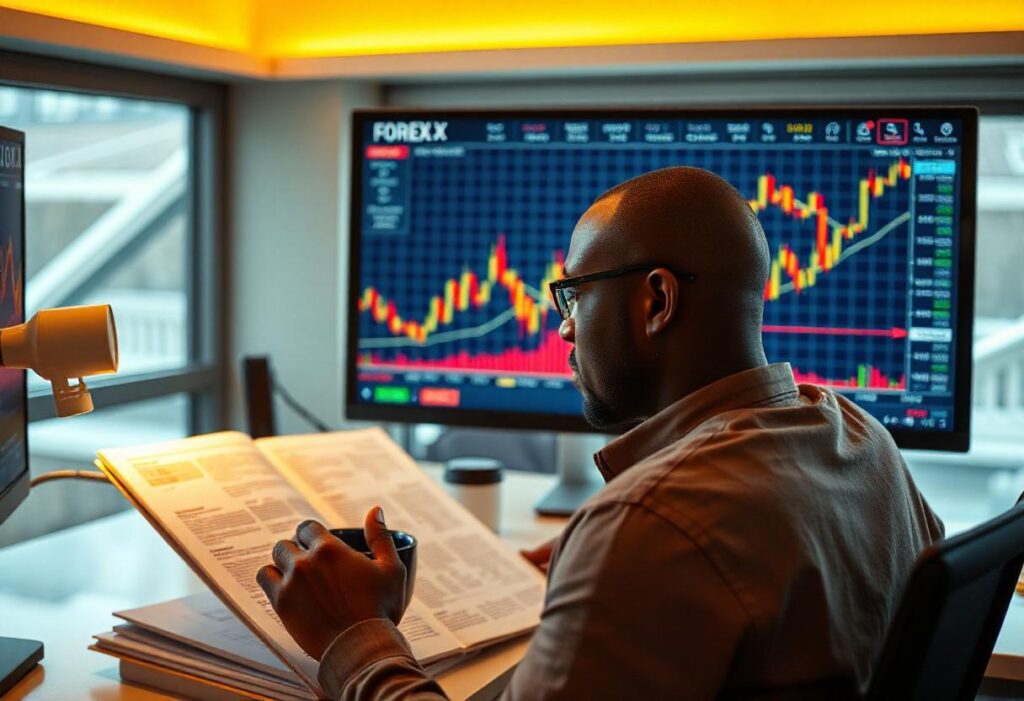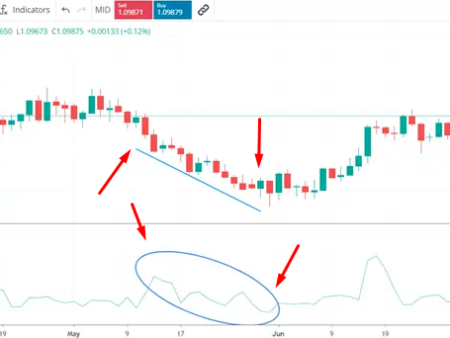The best & most up to date guide on How to Trade Forex easily
If you’re new to the world of forex trading, the question of “How to Trade Forex” has certainly popped up. This ultimate Forex beginner guide will take you through everything you need to know to get started. Forex, or foreign exchange, is one of the most popular markets globally, offering traders the chance to profit from the fluctuations in currency prices. In this guide, we’ll cover the basics of forex trading, from what forex means to how to trade forex successfully.
Forex Meaning: What is Forex?
Forex, short for foreign exchange, refers to the global marketplace where currencies are traded. It’s the largest and most liquid market in the world, with a daily trading volume exceeding $6 trillion. Forex trading involves buying one currency while simultaneously selling another. The goal is to profit from the changes in exchange rates between the two currencies.
For instance, if you believe the euro will appreciate against the US dollar, you would buy euros while selling dollars. If your prediction is correct and the euro increases in value relative to the dollar, you can sell the euros back at a higher rate, making a profit. It’s important to get the Forex Meaning as a Forex Beginner before moving further, so if you forgot it already, now is your chance to read it again.
What is Forex Trading?
In forex trading, currencies are traded in pairs, such as EUR/USD or USD/JPY. Each pair consists of a base currency and a quote currency. The base currency is the one you are buying or selling, while the quote currency represents the value of the base currency in terms of the quote currency. For example, in the EUR/USD pair, EUR is the base currency, and USD is the quote currency. If the pair is quoted at 1.1500, it means 1 euro is worth 1.15 US dollars. Traders aim to profit from the fluctuations in these exchange rates by speculating on whether the base currency will appreciate or depreciate relative to the quote currency.
Forex trading is conducted through various market participants, including individual traders, financial institutions, corporations, and central banks. This broad participation contributes to the forex market’s high liquidity, meaning that trades can be executed quickly and at competitive prices. Additionally, the forex market operates 24 hours a day, five days a week, spanning different time zones from Asia to Europe to North America. This continuous operation allows traders to react to global economic events and market news at any time, providing flexibility and opportunities for both short-term and long-term trading strategies.
The forex market’s accessibility is one of its major attractions. With the right tools and a reliable internet connection, anyone can engage in forex trading from virtually anywhere in the world. This accessibility, combined with the potential for high leverage, makes forex trading appealing to a wide range of participants, from novice traders to seasoned professionals. However, it’s essential to understand that the market’s complexity and volatility require careful planning and risk management to navigate successfully.
If you truly want to learn Forex, you must also understand that Forex Markets are open 24/5, unlike the stock market which has overnight activity 24/7. Which is a good thing, since you will have the weekends to relax, or find forex guides to read up on and test your skills in a demo account.

Forex Guide: How to Trade Forex
Step 1: Choose a Reliable Forex Broker
Your first step in forex trading is to choose a reputable forex broker, especially one with a demo account where you can watch forex tutorial, or test how to forex properly as your introduction to forex is just beginning. A broker acts as an intermediary between you and the forex market. Look for a broker that is well-regulated, offers competitive spreads, and provides a user-friendly trading platform, you can check out our reviews on most brokers, some examples are XM , TastyFX, Plus500, IronFX & Exness. It’s also essential to check the range of currency pairs available and the level of customer support provided.
Step 2: Open and Fund Your Forex Trading Account
Once you’ve chosen a broker, you’ll need to open a trading account. This process typically involves filling out an application form, providing identification, and depositing funds into your account. Most brokers offer various account types to suit different trading styles, including demo accounts for beginners to practice without risking real money.
Step 3: Learn the Basics of Forex Trading
Before diving into forex trading, it’s crucial to understand the fundamentals. To learn Forex, start by learning about key forex trading concepts such as pips, leverage, and margin. A pip (percentage in point) is the smallest price movement in a currency pair, while leverage allows you to control a large position with a smaller amount of money. Margin is the minimum amount required to open a leveraged position.
Step 4: Develop a Forex Trading StrategyA successful forex trader needs a solid trading strategy. Your strategy should outline your approach to the market, including the types of trades you’ll make, the currency pairs you’ll focus on, and the timeframe you’ll trade in. Popular trading strategies include day trading, swing trading, and trend following. It’s also important to set clear risk management rules, such as how much of your capital you’re willing to risk on each trade.
Step 5: Start Forex Trading
Once you’re comfortable with your trading strategy, it’s time to start trading. Monitor the markets and look for trading opportunities that align with your strategy. Use the tools and resources provided by your broker, such as charting software and market analysis, to make informed trading decisions.
Step 6: Review and Adjust Your Strategy
Forex trading is a dynamic and evolving process. It’s important to regularly review your trades and assess your performance. If certain aspects of your strategy aren’t working, don’t be afraid to make adjustments. The best traders continuously refine their strategies to improve their results.
Example of How to Trade Forex
Let’s consider an example to show you how to start forex trading and how it really works:
Imagine you believe that the euro will rise in value against the US dollar. You decide to buy the EUR/USD pair at a price of 1.1500. This means you’re buying euros and selling dollars. A few hours later, the price of EUR/USD rises to 1.1600, and you decide to close your position. Your profit is the difference between the buy and sell prices, which in this case is 100 pips.
If you had leveraged your position, this profit could be significantly magnified. However, leverage also increases the potential risk, so it’s essential to use it wisely. This is why you need to truly understand what is forex trading before diving any deeper.
Pros and Cons of Starting Forex Trading
- High Liquidity: The forex market is extremely liquid, meaning you can buy and sell currencies easily without significantly affecting the market price.
- 24-Hour Market: Forex trading is available 24 hours a day, five days a week, providing flexibility for traders around the world.
- Leverage Opportunities: Forex brokers often offer leverage, allowing you to control a larger position with a smaller amount of money.
- Low Costs: Forex trading typically has lower transaction costs compared to other markets, such as stocks or commodities.
- Diverse Trading Opportunities: With a wide range of currency pairs available, traders have numerous opportunities to profit.
- High Risk: The use of leverage in forex trading can lead to significant losses as well as gains.
- Complex Market: The forex market is complex and can be challenging for beginners to navigate.
- Market Volatility: Currency prices can be highly volatile, making it difficult to predict market movements.
- Lack of Regulation: Forex trading is not as heavily regulated as other financial markets, increasing the risk of fraud.
- Emotional Trading: The fast-paced nature of forex trading can lead to emotional decision-making, which can be detrimental to your success.
Tips for Successful Forex Trading
To enhance your chances of success in forex trading, keep the following tips in mind:
- Educate Yourself Continuously: The forex market is constantly evolving, and staying informed is key to success. Read books, take online courses, and follow market news to deepen your understanding of forex.
- Start Small: Begin with small trades and gradually increase your position size as you gain experience. This approach minimizes risk while you learn the ropes.
- Use Risk Management Techniques: Implementing risk management techniques, such as setting stop-loss orders and limiting your leverage, can help protect your capital from large losses.
- Keep Emotions in Check: Emotional trading can lead to poor decisions. Stick to your trading plan and avoid impulsive trades driven by fear or greed.
- Keep a Trading Journal: Recording your trades and analyzing them can help you identify strengths and weaknesses in your trading strategy.
Common Mistakes to Avoid in Forex Trading
While forex trading offers significant profit potential, it’s also easy to make mistakes. Here are some common pitfalls to avoid, thanks to our Forex Guide:
- Overtrading: Trading too frequently can lead to losses, especially if you’re chasing short-term gains.
- Ignoring the News: Economic news and geopolitical events can have a major impact on currency prices. Stay informed to avoid unexpected market moves.
- Using Excessive Leverage: While leverage can amplify profits, it can also lead to substantial losses. Use it with caution.
- Lack of a Trading Plan: Trading without a plan is a recipe for disaster. Always have a strategy in place before entering the market.
Conclusion
Forex trading is an exciting and potentially lucrative venture, but it’s not without its challenges, especially for Forex Beginners. By understanding the basics, developing a solid strategy, and continuously educating yourself on what is forex, you can increase your chances of success in the forex market. Whether you’re looking to trade for a living or simply as a side hobby, the knowledge and tips shared in this guide will help you start your forex journey on the right foot.
Remember, forex trading requires patience, discipline, and a willingness to learn. With the right approach, you can navigate the complexities of the market and potentially achieve your trading goals. Hopefully, this introduction to forex trading helped you make the first step into the educational journey of Forex Trading, because you can never have enough Forex Tutorials.










